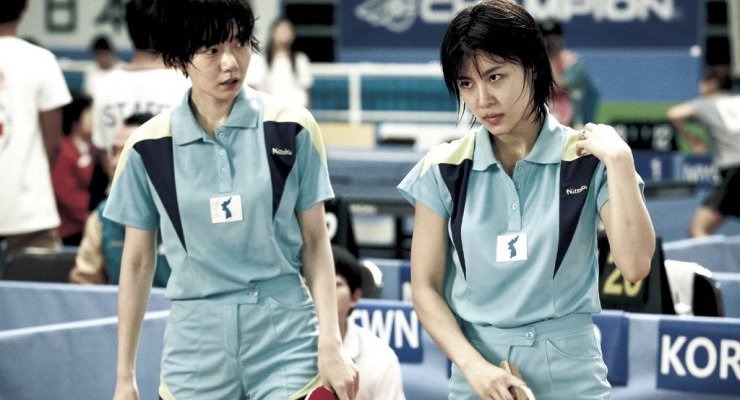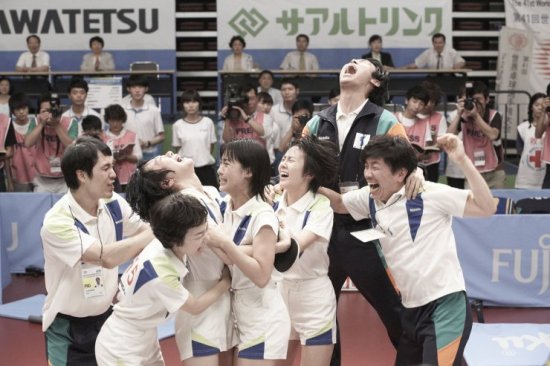The divide across the Korean peninsula has provided history with some of the most fascinating and horrifying accounts of human endeavour. Both the North and the South have flip-flopped between moments of sheer brutality against each other yet have also achieved poignant moments of recompense. While terrorist attacks and threats grab headlines, the strong underlying sense of nationality and ‘brother/sisterhood’ has spurred other stories of joint enterprise, family reunification and co-op sporting events that are smaller and more intimate in nature, hinting at the potential future for a united people; they are, after all, Korean.
One such tale of triumph over (ideological) adversity was obtained during the 1991 International Table Tennis Championships in Chiba City, Japan, where South Korean and North Korean table tennis players partnered to compete against the rest of the world. Brought to celluloid by director Moon Hyeon-seong (문현성), As One (코리아) flirts dangerously close with being an average TV movie for the majority of its’ running time yet manages to become an engaging and effective sports drama in the final act.
Facing off in the semi-finals during the 1990 Asian games, South Korean table tennis player Hyeon Jeong-hwa (Ha Ji-won 하지원) confronts her Northern rival Lee Boon-hee (Bae Doona 배두나), both determined to win not only for themselves but for the pride of their respective countries. Narrowly defeating her opponent, Jeong-hwa moves on to the finals but is bested by the Chinese champion (Kim Jae-hwa (김재화), nicknamed ‘The Great Wall’. As the teams prepare themselves for the 1991 Championships in Chiba City, the governments of the North and South make a surprising statement – they will combine their athletes to create a ‘Unified Korea’ team. Forced to play alongside each other, Jeong-hwa and Boon-hee must train to overcome the ideological differences between them and defeat their Chinese rivals once and for all.
Contemporary Korean films have a reputation for being remarkably even-handed in their representation of Northern protagonists, and As One is no exception. In fact, it’s largely thanks to the balanced approach and ideological banter that the film continues to be compelling during the incredibly lackluster first and second acts. For every quip about human rights comes a retort regarding misogyny; for every representation of stoic obedience is a portrayal of thoughtless misbehaviour. Interestingly it is the Northern athletes, led by Boon-hee, who are the most sympathetic and accommodating protagonists, while those from the South are often rude, aggressive and stubborn, as exemplified by Jeong-hwa. Such a concoction of characters offer predictable pleasures, but are entertaining nonetheless.
However the contrivances of the narrative appear all too frequently and reduce the athletes into one-dimensional caricatures often found in Korean TV dramas – yet without the possibility for development – with only Jeong-hwa and Boon-hee narrowly escaping. A true story such as this means the finale is inevitably predictable, yet the decision to include a supporting cast of stereotypes with stereotypical scenarios is perplexing and detracts from the overall enjoyment. Also halting the engagement of the audience is the soundtrack, which rarely naturally enters the film. With the exception of the final act, the music is continually a distraction and is often disjointed from prior scenes.
Luckily As One manages to redeem itself during the last moments as the final matches of the tournament are thrilling. Director Moon Hyeon-seong (문현성) makes wonderful use of editing and slow-motion techniques to deliver exciting and suspense-filled moments that are riveting and adrenaline-inducing. Strangely he constructs the penultimate match as more thrilling than the final itself, with Yoo Sun-bok’s (Han Ye-ri (한예리) underdog tale an incredibly compelling part of the film, yet also employs enough different filmic techniques to make the final a powerfully emotive viewing experience. The trials faced during the final also allows for the introduction of melodrama which is wonderfully capitalized on as the two teams are forced to part ways. It is here that the acting prowess of the two talented lead actresses finally appears as their parting is both poignantly sincere and heart-wrenching, exhibiting a quality that is a testament to how important the event was for all involved.
Much has been reported regarding Ha Ji-won’s table tennis training by the very champion she portrays, and how her skill level potentially rivals world class athletes. Sadly, due to the rapid editing and stylization, the actress’ skill level does not fully translate into film. That said, Ha Ji-won’s passionate, determined and stubborn performance is articulated well throughout As One with her reluctance to accept her long-term rivals as partners convincing. The characterization often gives her little room to manoeuvre, however during the final act Ha Ji-won is utterly enthralling as she bids farewell to her close friend as her evolving level of grief portrays incredible emotional turmoil.
Bae Doo-na shares a similar fate as Boon-hee, who gives a more stoic-yet-understanding performance and as such is the more endearing protagonist. Her weight loss, in attempting to portray the same physique as the real Boon-hee, is quite a shocking visual as her thin frame conveys a frailty and tenderness not ascribed to others. Bae Doo-na’s physical dedication also adds potency to the trials she endures throughout the narrative, while her level-headed and thoughtful acting style present a mature and contemplative counter to Ha Ji-won. Due to Bae Doo-na’s performance the final parting conveys penetrating sincerity, making it virtually impossible not to be moved emotionally.
Out of all the supporting cast only one actress rises above the stereotypical roles bestowed upon them – Han Ye-ri. Her turn as anxious novice Yoo Sun-bok is entertaining and poignant, particularly during the penultimate game. Unfortunately her tale is somewhat faded into the backgrounded as team dynamics and political tension receive focus, yet Han Ye-ri gives a highly capable performance as the underdog achiever.
Verdict:
Thanks to the true story on which it’s based, As One has plenty of potential for an incredible sports drama yet only manages to partially capitalise on the events that unfolded. While the ideological differences are balanced and entertaining, and the final matches are thrilling and exciting, the choice to fill the narrative with one-dimensional stereotypes and scenarios is detrimental to the film overall. That said, the strength of what transpired is moving and will undoubtedly remind audiences of the power of sports in uniting disparate people, and will certainly hold particular resonance for those of Korean descent.
★★☆☆☆





